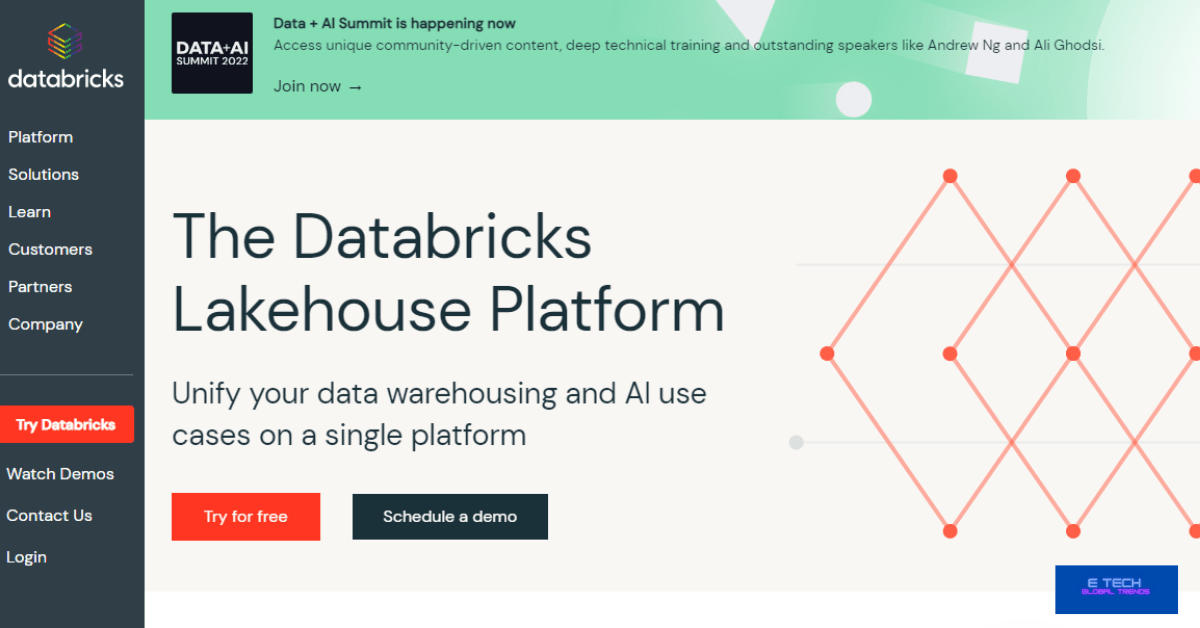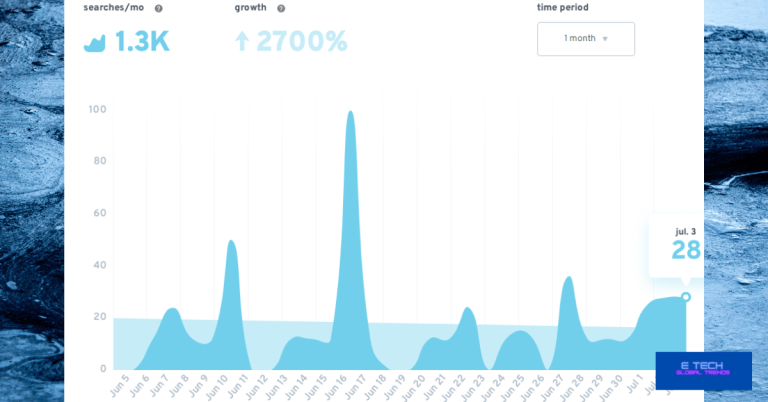Data Lakehouse
What exactly is a Data Lakehouse? A data lake house is an open data management architecture. that combines data lakes’ flexibility and cost-efficiency. plus scale with data management and ACID data warehouse transactions, enabling data analytics (BI) and machine learning (ML) on all data. Open data management structures called “data lake houses” bring together features of data lakes and data warehouses.
This meta trend known as Next-gen Data Management includes data lake houses. A data lake house fuses data lakes’ flexibility and cost-effectiveness with data warehouses’ ACID transaction capabilities.
After being unveiled for the first time last year.
the new architecture gained momentum.
However, the market for this product category is now starting to really take off that is as major computer giants like Microsoft. and Amazon announce plans to integrate this architecture into their platforms.
Many of today’s data management solutions are either expensive. rigid, or lack trustworthy security (or all of the above).
for instance, on-site data warehouses are also frequently not very scalable.
What is data management?
Well it’s not too difficult to understand
Let’s think about it in this way…
Data management is…
- the creation,
- implementation,
- management of plans, policies, procedures,
- processes that deliver, control, safeguard
- increase the quality of the data
- its assets across the course of their lives.
These are the main objectives
Is it truly helpful for businesses to grow?
therefore, the image of data is the overview of the business. Within one focus, it shows;
the “ health of the business …”
In this article, we clarify this concept in many ways. You may notice that there are repetitions. No, we intentionally include them. We suppose it will make it easy to get the concept.
If you want to effectively use your data and provide insightful business results, a well-planned data management strategy is essential. All of your company’s data-related activities, from collection to utilization, are included in data management. It includes data sharing, data storage, data quality assurance, and data analysis.
Database management systems use many different types of data, including financial data, consumer data, and more. Inadequate data quality can emerge from poor data management and result in inaccurate corporate growth projections, cash flow assumptions, and tax calculations. Data security risks may result from it.
Why is this data management so important?
One of the most crucial tasks that most businesses nearly always overlook and often results in significant loss is managing the data of your organization effectively.
As a result, it is critical to manage your data properly if you are in charge of a company that must deal with a significant quantity of data.
Examining the advantages of effective data management, let’s see what they are.
1.0 Analysis of Data;
That Is Useful and Effective. sure?
Similar and duplicate data can cause your company a lot of issues and, in some situations, even fatalities. A sophisticated and judgmental data analysis is what we can obtain with MDM, and this is essential.
2.0 Elimination of Redundancy:
We can lessen the redundancy in the data by handling it correctly. If a huge quantity of data is involved, redundancies in the data are certain to arise; this is where data management comes in, as it aids in removing the redundancy in the data.
As a result, data management becomes necessary if you run a big organization.
3.0 Coherence of the Data;
Working with the data is easier. because MDM ensures the consistency of the data. which eliminates confusion. plus redundancy and facilitates a streamlined, standardized workflow.
4.0 Flexibility:
When compared to other data management techniques, MDM offers more flexibility for data.
5.0 Easy Backup:
If you are using centralized data sources for MDM, taking backups is simple. which is very useful for disaster management.
How does it work?
With the openness, flexibility, and machine learning assistance of data lakes, the Databricks Lakehouse System includes the finest aspects of data lakes and data warehouses to give the dependability, robust governance, and performance of data warehouses.
By removing the old data silos that divide and complicate data engineering, analytics, business intelligence, data science, and machine learning, this unified strategy streamlines your modern data stack. To enhance flexibility, it is designed using open-source software and open standards. You can operate more effectively and develop more quickly thanks to its shared approach to data administration, security, and governance.
If you are enquiring about today’s modern data management platforms.
they combine all of the following:
- Multidomain MDM
- Data as a Service
- Big Data scale
- Commercial Graph capabilities
- Predictive Analytics
- Machine Learning
- Social collaboration and workflow
All are fully integrated into a platform as a Service (PaaS) in the cloud upon which new data-driven apps are being deployed
Not as difficult as you think?
the unified approach streamlines your data architecture. You may get rid of the difficulty and expense that prevent your statistics and AI programs from reaching their full potential with a lakehouse.
What are the data warehouses’ drawbacks?
As a centralized location for the storage and analysis of massive amounts of structured data, data warehouses have become a mainstay in the field of data management. Even while they have many advantages, it’s necessary to be aware of their limits as well.
Certainly, there are some major drawbacks of data warehouses…
1.0 Complex Data Governance
Data governance procedures, such as guaranteeing the quality of data, data, and lineage. this compliance is a challenge in a data warehouse setting. The data ecosystem is growing, making it harder to manage metadata integrity, access constraints, and data protection.
What exactly is data governance, and why is it crucial?
The administration of data assets may consider under; this case is the same for the Data Lakehouse too.
- the control,
- authority,
- planning,
- monitoring, &
- enforcement of data governance.
It offers business guidelines.
guidelines, standards, roles, and roles they need to manage data as a valued asset.
Consider it as a structure that guarantees data is handled correctly and efficiently during its existence.
For a number of reasons,
Data governance is essential in companies.
First off,
It establishes guidelines and requirements for gathering data, storage, & use, ensuring data quality and integrity. accordingly.
Organizations may maintain accurate, trustworthy, and uniform data across several systems and departments by putting data governance strategies into effect.
Second,
data governance makes it possible to adhere to laws and business requirements.
Especially, Organizations are bound by a number of rules and regulations regarding data security and privacy in today’s data-driven society.
through establishing controls and procedures that comply with these legal standards, companies may reduce the chance of data breaches & non-compliance. This is made possible through data governance frameworks.
Thirdly,
Data governance encourages openness and trust inside a company.
Employees may readily understand who is responsible for tasks involving data management by explicitly identifying roles and responsibilities. This encourages cooperation, prevents effort duplication, and guarantees that data is properly used across departments.
Additionally, data governance aids in making wise decisions. When managing data effectively. it may serve as a trustworthy source of information for projects including business intelligence, operational excellence, and strategic planning.
So, Organizations are better able to make decisions based on reliable insights when they have accurate and consistent data.
Finally,
Data governance enables businesses to maximize the value of their data assets.
Organizations may use data for innovation, development, and competitive advantage by managing it as a valued asset. By facilitating data exchange, integration, and collaboration, effective data governance enables firms to identify new possibilities and unearth priceless insights that may propel corporations.
In conclusion,
The importance of data governance may be summed up as follows:
it assures data quality & integrity, facilitates regulatory compliance, encourages trust and openness, supports sound decision-making, and aids companies in maximizing the value of their data assets. Organizations may build a strong base for effective data management and use by putting in place strong data governance processes.
2.0 Low Flexibility
Data warehouses often adhere to a preset format and structure, which makes it challenging to adapt to changing data demands or shifting business requirements.
It can take a while to adjust or add new data sources, and the warehouse schema may need to be significantly reorganized.
3.0 Data Lag (latency)
Data warehouses use Batch processing commonly, where data feeding is on a regular basis at predetermined intervals.
As a result, there is a delay between the moment of collecting data and when it is ready for analysis. This might be problematic if real-time or will need real-time insights.
4.0 Scalability Issues
Conventional data warehouses may experience scalability issues as the amount, velocity, and diversity of data increase. Increasing hardware resources may be expensive and take a lot of time and work.
Additionally, it might be difficult to handle unexpected increases in data load, which can result in reduced performance or processing bottlenecks.
5.0 Limited Data Structures
Data warehouses fail to manage semi-structured or unstructured information well since they are built for structured data alone.
In the current data landscape, companies deal with a range of data formats, including text, photos, audio, and video.
this constraint becomes crucial. even for data Lakehouse.
Organizations are rapidly implementing novel strategies to get around these constraints, including data lakehouses, that combine the adaptability of data lakes plus the reliability and efficacy of data warehouses. Data lakehouses overcome many of the drawbacks of conventional data warehouses by utilizing cloud-native technology and contemporary data management techniques, allowing businesses to fully utilize their data assets.
A new data management structure is now required!
Modern data management architectures can handle enormous amounts of data. in other words, they are naturally compatible with cloud computing.
Expanding next-generation information management architectures will significantly contribute to the anticipated 5-year double-digit growth of the enterprise data management industry.
Why is data management so important?
in addition to the most precious resource is data. after that, it can use to improve marketing initiatives. streamline operations and lower expenses. it will make better business decisions in order to boost sales and profits.
you may identify Data Lakehouse as a solution.
Data is the cornerstone on which new projects are developed and implementation is reviewed, from maintaining existing clients to moving into new horizons.
Conclusion
Above all, Data management is a crucial component of IT companies. that run commercial applications. above all, it offers analytical data that aids corporate leaders. company managers. and other ultimate consumers in making decisions. also developing strategic plans.
in addition, Despite the existence of giants like artificial intelligence, blockchain technology, and big data analytics. it is difficult to obtain high-quality data in a vast amount.
Well, Data Lakehouse will be a nice solution. You may try it.
Read more on related topics; Wonderbotz- an RPA trend, smart automation of a business







